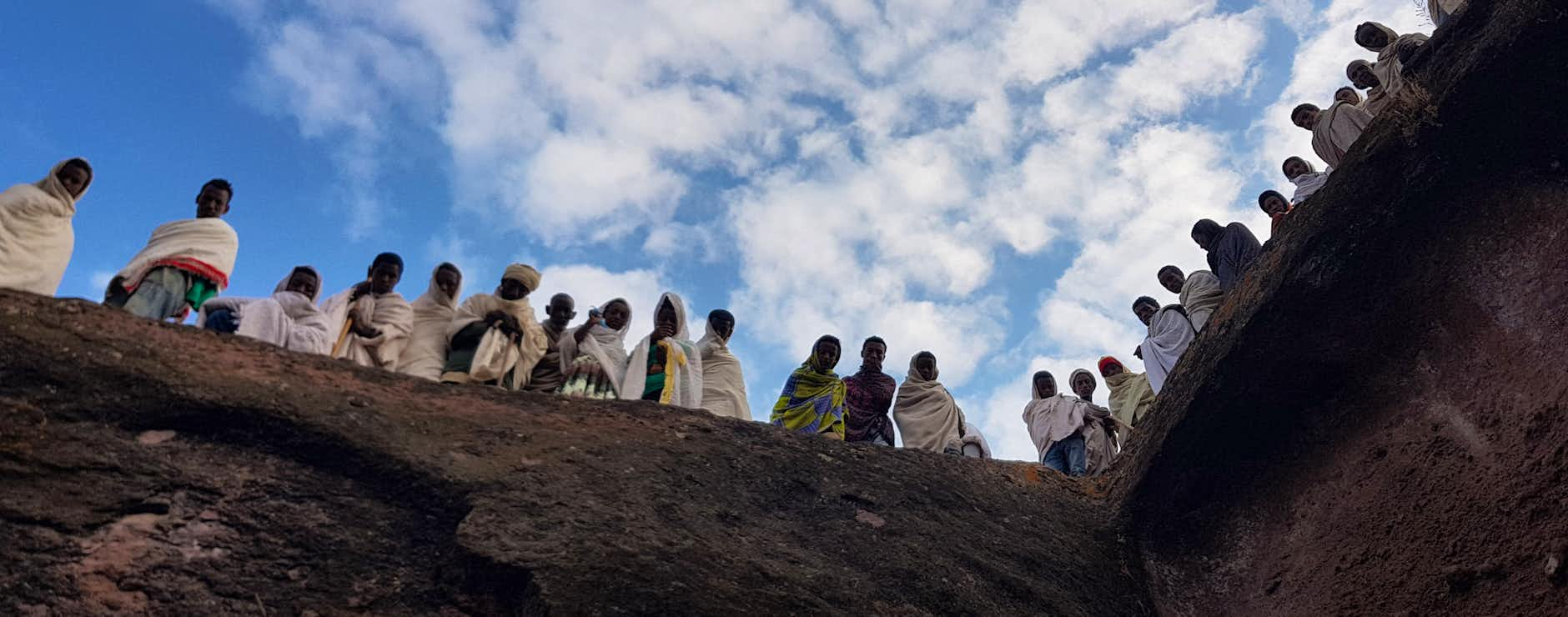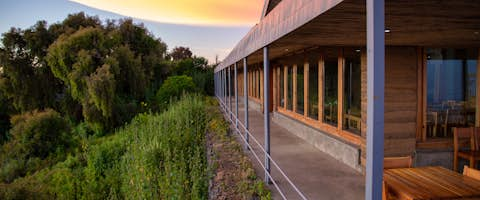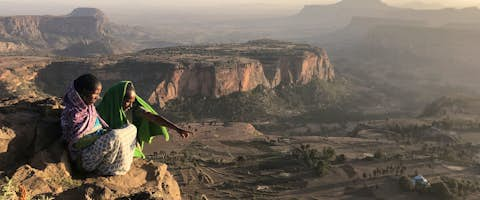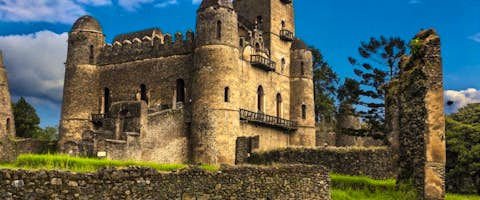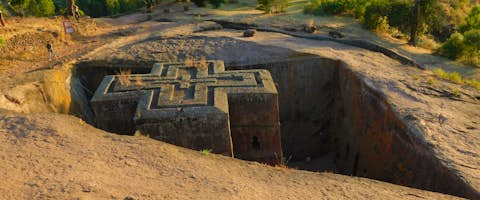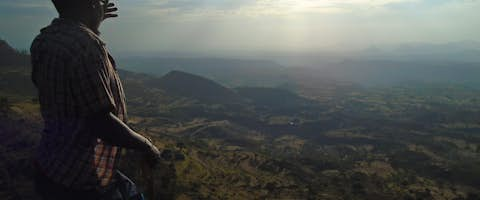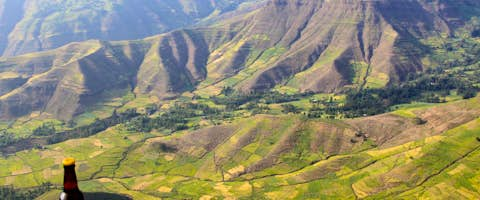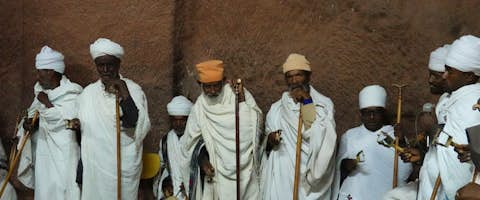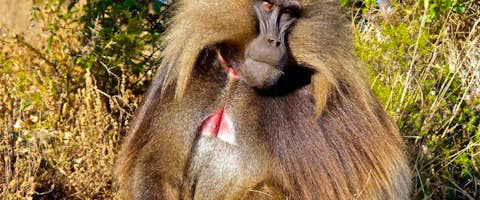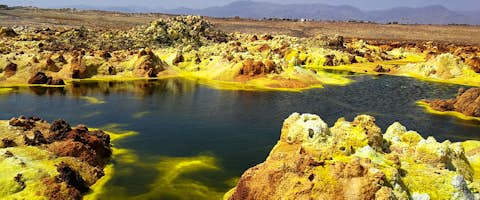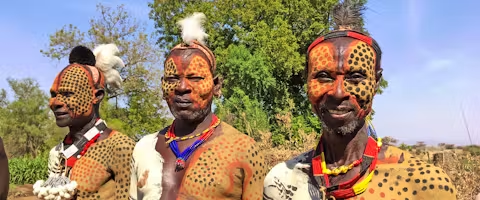Ethiopia's Festivals
-
Ethiopian Christmas (Leddet/Genna) (7th January)
Genna (also called Liddet) is the Ethiopian equivalent of Christmas, celebrated on the 7th of January every year. The actual Genna celebration is preceded by a night long Vigil following 40 days of fasting where meat, egg and dairy products are forbidden.
During Christmas Eve, there is a church service that runs through the night until 9am. The end of the mass service then heralds the beginning of the Genna celebration and the conclusion of the fasting period of Advent locally known as Tsome Gehad.
Doro Wote, a spicy chicken stew, is typically the first post-fasting meal.
Genna is mainly a family-oriented holiday and people in the countryside still maintain the tradition of playing Yegenna Chewata, a hockey-like game, following the prior evenings service. Yegenna Chewata, according to tradition, is believed to have been played by the shepherds on the night Jesus was born. If you are travelling during this time, Axum and Lalibela are among the best places to be.
-
Epiphany (Timket) (19th January)
This festival commemorates the baptism of Jesus by John the Baptist in the river Jordan and is the most colourful festival of the year.
What makes this three-day festival so unique is that it's the only time when the Tabot - a replica of the Ark of the Covenant containing the Ten Commandments - is taken out from the churches across the country.
Covered by an ornamental cloth, accompanied by songs, blowing of trumpets and burning incense, the Tabot will be taken to a tent, close to a pool or stream.
Tabots are kept in a tent while the priests hold a vigil through the night, lighting candles and oil lamps. Most followers do not go home, and they spend the night praying, singing and dancing. The prayers, dancing and music continues the following day.
The pool or stream is then blessed and sprinkled on believers. Everyone will fight to touch the water and share the blessing. The Tabots are then returned to their respective churches in the same manner they were brought out, except for St Michael's Tabot which remains until the following day.
The best place to be during Timkat experience is Gondar, where the festivities culminate in a crowded and colourful afternoon at the 17th century Fasilides' Bath, which is filled with water for the occasion. Addis Ababa also provides a unique experience of Epiphany at Jan Meda.
-
Enkutatash (New Year) (11th September)
Ethiopia follows the Julian calendar with 12 months of 30 days each and a 13th month of 5 days (6 in a leap year). It's for this reason that Ethiopia has been nick-named 'the country with 13 months of sunshine'.
The Ethiopian New Year, which is eight years behind the Gregorian calendar, falls on the date that the Queen of Sheba allegedly arrived back in Axum after visiting King Solomon in Jerusalem.
In many places, children dressed in new clothes dance through the neighbourhood, distributing paintings (mainly of angles). They will in turn be given bread or money in return for their New Year wish. During New Year's Eve, torches of dry wood are burned in front of houses while the crowds sing and dance. Everyone will then jump the ash to mark the shift from the old year to the new one.
-
Meskel (Finding of the True Cross) (27th September)
Meskel is one of the biggest religious festivals among Ethiopian Orthodox followers that commemorates a fourth century event where Empress Helena, mother of Constantine the Great, discovered the True Cross on which Christ was crucified. This festival is also registered with UNESCO as an element of the Intangible Cultural Heritage of Humanity.
The centrepiece of this unique festival is the lighting of a massive conical bonfire called a Damera and all the dancing and feasting surrounding it. The largest Meskel gathering takes place in Addis Ababa’s Meskel Square, where hundreds of thousands of people, both locals and tourists, gather to watch the colourfully dressed priests chant, pray and dance.
There are also equally magnificent celebrations across the country, including in Axum and Gondar.
-
Great Ethiopian Run (November)
The Great Ethiopian Run is one of the biggest and the best-known running events in Africa.
Taking place on the last or second to last Sunday of November, it attracts an increasing number of runners every year. In 2017, there were 44,000 participants, including hundreds of elite runners.
Whether participating in the event or watching from the side-line, it’s a must-see or travellers visiting Ethiopia in November.

Brilliant says
If your travel dates coincide with any festivals, our expert team can help craft your itinerary to get the most out of the celebrations.
Popular Trips to Ethiopia
Working with carefully selected local guides, our Brilliant tours cover the length and breadth of Ethiopia. Incorporate any of the amazing festivals above if your travel dates allow.


